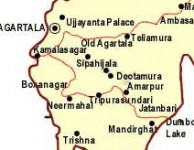Those mythical bomb blast deaths

Almost every one reported that the explosions which took place in Agartala, the capital of Tripura, on October 1 evening had killed at least 2 to 4 persons and wounded many others. The international news agencies, namely AP, AFP, Reuters, Bloomberg, AHN, and UPI reported deaths.
But in reality, nobody died due the explosions on that day. The Tripura Director General of Police Pranany Sahay confirmed on Thursday that nobody was killed in Wednesday night¿s serial blasts in Agartala. Addressing the media persons in the capital city, Mr Sahay also said that only 52 people were injured in the incident.
The agency reporters presented the news without convincing quotes from the police and authority regarding the casualties. Some quoted hospital sources and some eye witnesses. The Reuters correspondent in Guwahati, quoted the Tripura police spokesperson Nepal Das on October 1 to say that at least two people were killed and about 100 wounded when four bombs exploded¿ at Agartala. But amazingly, the same police officer (Mr Das) was seen during a news slot of a satellite television channel on October 2,
where he declared that the police did not have any information regarding the casualties. ( http://www.france24.com/en/20081002-india-tripura-blast-northeast-terror-attack )
The Associated Press reported (dateline Gauhati,
The Agence France-Presse quoted ¿a police spokesman¿ to say that ¿at least one person was killed and 100 more wounded Wednesday when five bombs ripped through busy markets and a bus station in a northeast Indian town¿. The news item also added, ‘All the four big markets of Agartala have been targeted-the official said, adding 100 people were wounded, 15 of them critically’.
The reporter then quoted the deputy Inspector General of (Tripura) police Nepal Das (but did not mention that Mr Das himself was the spokesman) for other information like ¿at least two of the blasts were powerful¿ and ¿most
of the victims were shopping on the eve of Eid-al-Fitar, which marks the end of the Muslim fasting month of Ramadan¿ with ¿Hindus were also out in large numbers, stocking up for the annual religious festival of Durga Puja which begins on Saturday¿. http://afp.google.com/article/ALeqM5iwiTPBsEYsRy95eMqkS-taxZ0Ckw
Similarly, the All Headline News reported (date line Agartala, October 1)
http://www.allheadlinenews.com/articles/7012504976 and
The United Press International also reported 4 deaths. http://www.upi.com/Top_News/2008/10/01/UPI_NewsTrack_TopNews/UPI-61931222914036/ . Bloomberg (with the byline of Michael Heath), reported two deaths http://www.bloomberg.com/apps/news?pid=20601091&sid=aPZfS4b_3Q18&refer=india as did the Indo Asian News Service (dateline Agartala, Oct 1) and the Asian News International reported (date line Agartala,
Oct 2) and the Press Trust of
But the local newspapers of Tripura were restrained while reporting the incident. They did not report about any casualty. Daily Desher Katha, a prominent Bengali daily from Agartala reported only about the injured persons. Speaking to this writer from the news desk of Daily Desher Katha, a senior journalist clarified that the reporters got confused with other dead bodies in the same hospital, where blast victims were taken for treatment.
"I personally came to know that one patient died on Wednesday night, which some reporters might thought as a blast victim. But he was admitted in the hospital for other ailment and was no way related to the series of explosions," he said.






